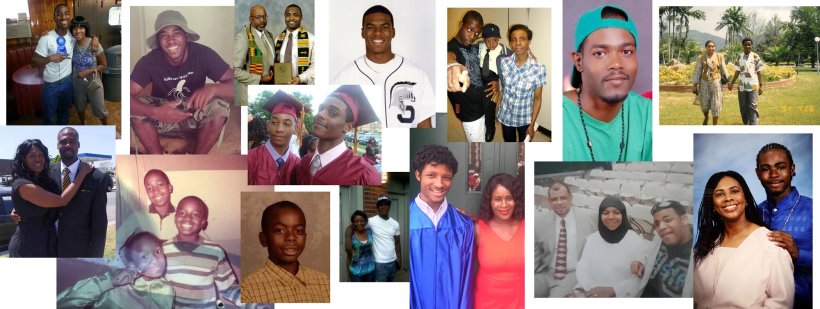Fifteen days after Mother’s Day last year, George Floyd lay facedown, arms bound, calling for his mother with his final breaths. She had died two years earlier, but as he lay on the pavement, a white police officer’s knee compressing his airways for over nine minutes, his oxygen-deprived brain reached for a symbol of safety and compassion. He made the longing appeal a child invokes for all the things “mama,” and only “mama,” could provide.
A year later, 15 mothers from across America who lost their Black sons at the hands of police speak out about life after tragedy—about what happens when the demonstrations, cameras, hashtags, and viral moments fade. When the tragedy is not our own, we can turn the television off, log out of Twitter and Instagram, and walk away, perhaps shaking our heads in disgust. The survivors bear the burden for a lifetime.
Some of the mothers, wishing they could have protected their children from such cruelty, wondered if their sons, too, called out for them with their last breaths. They heard Floyd’s cries as a charge to continue fighting for police accountability and protesting the senseless deaths of Black and brown men and women disproportionately killed by officers—killings no longer shocking in America, with its racist criminal-justice system and public policies. In the last decade, roughly 8,000 people of color had fatal encounters with police, more than half of them Black men. Last year alone, 24% of people whose deaths occurred in the presence or at the hands of police were Black, though roughly 13% of the population is Black.
Year after year, families of color suffer such trauma, joining a growing group of survivors. Most then endure the sullying of their child’s name to justify the killing: He sold loosies; he had methamphetamine and fentanyl in his system; he had an outstanding warrant. Other times, the victims were simply living: He was leaving his bachelor party; he was standing near his apartment building; he was heading home after a night out with friends. Only in a system that paints people of color, disproportionately Black men, as the embodiments of threat, and police as above the law—shielded by qualified immunity—can that narrative exist. Parents of color must now instill fear of the uniform in their children. Put your hands on the dash. Speak calmly and politely. Don’t make any sudden moves. Say “Yes, sir” and “No, officer.” Even then, their child may not make it home.
Here, surviving mothers, now unlikely activists, share the impact of such heartbreak. Like George Floyd, some of their sons have become lasting symbols of America’s virulent subjugation and police brutality: Amadou Diallo, Oscar Grant, Sean Bell, Eric Garner. Others didn’t draw international headlines, but their families’ anguish and grief is just as devastating. These mothers tell the stories of the sons they lost, the lives they led, and the sorrow they—the survivors—still endure.
Click on the linked names below to read the corresponding interview.
Kadiatou Diallo: Amadou Diallo, 23, February 4, 1999
BRONX, NY
The last time Amadou called me was on January 31, 1999. I was in Conakry, Guinea, in West Africa. He was in New York City. He said, “I’m so happy right now.” He told me about a girl he was interested in, and then he said, “I’ve finally saved enough money! I’m ready to go to college, mama.” Four days later, he would be dead.






















































































































